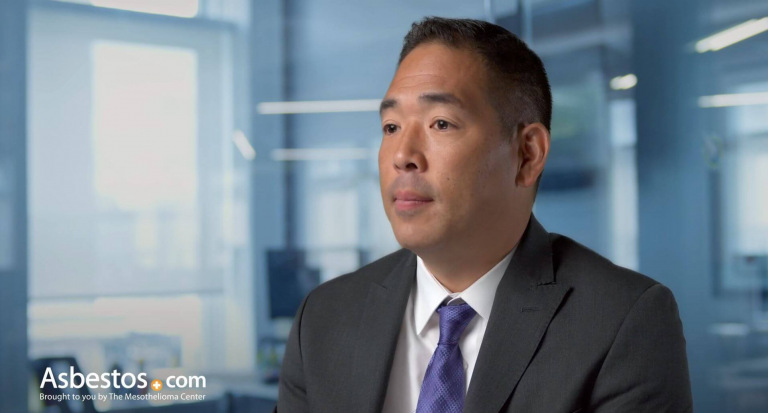I’m excited to start my journey with this new Opdivo-Yervoy mesothelioma treatment. Whether my cancer responds to the new immunotherapy remains to be seen. The first scan will be three months after I started treatment. Either way, I’m in good hands with a new health care team that’s willing to fight as hard as I am.
Opdivo (Nivolumab) for Mesothelioma
Nivolumab is an immunotherapy drug marketed under the brand name Opdivo. In 2020, the U.S. Food and Drug Administration approved the combo of Opdivo with Yervoy. The treatment works best for patients with a new diagnosis of advanced pleural mesothelioma.
What Is Opdivo (Nivolumab)?
Opdivo (nivolumab) is an immunotherapy drug designed to treat mesothelioma. It enhances the body’s immune response against cancer cells. In October 2020, the U.S. Food and Drug Administration approved Opdivo combined with Yervoy (ipilimumab).
The treatment is a first-line treatment for pleural mesothelioma patients who are not eligible for surgery. This approval marked a milestone: Offering patients a new option beyond traditional chemotherapy.
The CheckMate 743 clinical trial’s results supported Opdivo’s approval. The trial’s results demonstrated significant survival benefits for mesothelioma patients. Three years after the trial, 23% of patients treated with Opdivo and Yervoy were alive. In contrast, only 15% of those who received chemotherapy were alive.
Additionally, the combination showed a longer response duration regardless of mesothelioma cell type. Many patients maintain benefits for up to three years after treatment.
Opdivo Information
Opdivo is an intravenous drug and a checkpoint inhibitor in immunotherapy. Mesothelioma treatment cycles take place every three weeks.
| Opdivo (Nivolumab) Information | |
|---|---|
| Drug Name | Opdivo (Nivolumab) |
| Manufacturer | Bristol Myers Squibb |
| Dosage | 360 mg every 3 weeks |
| Administration | Intravenous |
| Drug Class | Immune checkpoint blockade |
| Medical Code | J9299 |
| Chemical Property | Human monoclonal PD-1 antibody |
| Interacting Drugs | Thalidomide, pomalidomide, lenalidomide |
| Medical Studies | Study of Nivolumab Combined With Ipilimumab Versus Pemetrexed and Cisplatin or Carboplatin as First Line Therapy in Unresectable Pleural Mesothelioma Patients (CheckMate743) |
| FDA Warning | Pneumonitis, colitis, hepatitis, hypophysitis, encephalitis, nephritis, renal dysfunction, skin rash, fetal toxicity |
Dosage for mesothelioma patients may vary. Doctors will tailor treatment plans based on the patient’s needs and overall health. The patient’s response and tolerance to the therapy will determine treatment duration.
How Does Opdivo Work to Treat Mesothelioma?
Opdivo is an immune checkpoint inhibitor that helps the immune system attack mesothelioma cells. It blocks the PD-1 pathway, which cancer cells often use to evade detection by T cells.
By inhibiting the PD-L1 protein in this pathway, Opdivo allows T cells to recognize cancer cells as threats and attack them, helping to slow or stop tumor growth.
Opdivo and Yervoy for Mesothelioma
When used together, Opdivo and Yervoy form a powerful combination treatment. Opdivo blocks the PD-1 pathway, allowing T cells to identify and attack cancer cells. Yervoy inhibits the CTLA-4 protein, boosting T-cell activity and enhancing immune responses.
The dual action creates a more robust immune response. That’s why the combination of Opdivo and Yervoy is more effective than either drug alone.
“This combination [Opdivo and Yervoy] is a game-changer, showing unquestionable survival benefits for mesothelioma. It confirms that the disease is subject to the harnessing of the immune system. This will open many doors.”

Opdivo Side Effects
Opdivo can cause side effects like joint pain, pneumonitis and other immune-related side effects in mesothelioma patients. These occur because of Opdivo’s impact on the immune system. While the immune system recognizes and attacks cancer cells, it may also target healthy cells. If damage occurs to healthy cells, it can lead to immune-related reactions.
Common Side Effects of Opdivo
Similar to other checkpoint inhibitors, such as pembrolizumab (Keytruda), disruptions to the immune system cause the most severe side effects of Opdivo.
Most Common Opdivo Side Effects
- Decreased appetite
- Fatigue
- Low sodium levels
- Low white blood cell count (lymphocytopenia)
- Pain in muscles, bones, and joints
Other common side effects include shortness of breath and cough. These side effects can mirror those of lung cancer or pleural mesothelioma.
Less Common Opdivo Side Effects
- Anemia
- Constipation
- Diarrhea
- Fever
- High potassium
- Low calcium
- Nausea
- Weight loss
Most patients do not experience all the common side effects. The majority of side effects are reversible or regress after complete treatment.
Rare Side Effects of Opdivo
Rare side effects of Opdivo, such as organ damage, result from inflammation. These reactions occur in less than 4% of patients but can become life-threatening. They occur when Opdivo causes severe inflammation in an area, leading to scarring and tissue damage.
Rare Side Effects
- Hormone gland issues (thyroid, pituitary, adrenal glands and pancreas)
- Inflammation of the brain (encephalitis)
- Intestinal problems (colitis)
- Kidney problems, including nephritis and kidney failure
- Liver problems (hepatitis)
- Lung problems (pneumonitis)
- Problems with other organs
- Skin problems
Doctors administer Opdivo via IV injection. In rare cases, this may cause severe infusion reactions. The reactions may include fever, dizziness, itching, rash, chills or shaking.
Opdivo and Yervoy Side Effects
When combined with Yervoy, Opdivo can introduce new or more severe side effects. The combination may increase the risk of mild issues like hormone imbalances, which can become more pronounced.
“The most common side effects of the ipilimumab and nivolumab combination include fatigue, itching, diarrhea, rash, pain in muscles and joints, decreased thyroid hormone and, rarely, inflammation of the lungs, known as pneumonitis,” said Dr. Estelamari Rodriguez, a thoracic oncologist at the University of Miami Health System.
Patients who experience pneumonitis, inflammation of the lungs, or joint inflammation may require immunosuppressive treatment with prednisone or other steroids.
Prolonged use of corticosteroids may reduce the immune system’s effectiveness. This can lead to vision problems or changes in blood sugar levels.
Many patients can tolerate the Opdivo-Yervoy combination treatment without any side effects. Pleural mesothelioma survivor Emily Ward met with her oncologist at Dana-Farber Cancer Institute about the combo treatment. “They all said it would get worse before it gets better, but I’m tolerating it fine,” Emily said.

Who’s Eligible for Opdivo?
Opdivo is for adults with inoperable pleural mesothelioma. They must not have had prior treatment. It is often used with Yervoy as a first-line therapy. Eligibility typically depends on factors like cancer stage and overall health.
Patients should be in otherwise good health before starting the regimen. “I have seen a lot of toxicity with it and side effects, so it is not a benign treatment,” Dr. Jeffrey Velotta, a thoracic surgeon at Oakland Medical Center in California, told The Mesothelioma Center at Asbestos.com.
“I personally feel that immunotherapy is going to be better in the adjuvant setting,” said Velotta, noting that patients who are healthy enough for surgery may tolerate treatment better. Your oncologist will assess if Opdivo is right for you. Always consult your healthcare team to discuss eligibility.
Mesothelioma Clinical Trials Involving Opdivo
Several clinical trials continue to explore Opdivo for treating mesothelioma as a single therapy and in combination with other drugs. The trials also examine the potential benefits of Opdivo before or after other treatments like surgery.
For example, a pioneering study at the Netherlands Cancer Institute in 2015 found promising results for Opdivo in treating pleural mesothelioma that recurs after other treatments. Patients in the study had minimal toxicity and long-lasting results.
Peritoneal Study Open to Surgical Patients
A new trial at The University of Chicago is testing nivolumab and ipilimumab in operable peritoneal mesothelioma patients. Researchers want to see if combining these immunotherapies before and after surgery can lower cancer recurrence. They also want to know if it can delay the regrowth of tumors.
Researchers expect to finish the trial by late 2025. Participants have undergone treatment for two years, followed by 42 months of follow-ups.
Neoadjuvant Trial Enrolling Surgical Pleural Mesothelioma Patients
A Johns Hopkins trial is testing nivolumab and ipilimumab as a presurgery treatment for pleural mesothelioma patients. Participants will receive this combination for one year after standard treatments.
Researchers want to know its safety and effectiveness over a five-year period. Surgical candidates with epithelial or biphasic histology and good overall health are eligible.
CheckMate 743 Phase III
The phase III CheckMate 743 trial, sponsored by Bristol Myers Squibb, had 600 patients from 20 countries. This study compared nivolumab and ipilimumab to the standard chemo: Pemetrexed and cisplatin or carboplatin.
The results showed that patients on Opdivo and Yervoy had an 8% higher three-year survival rate and a four-month longer median overall survival.
Things to Consider Before Taking Opdivo
Before starting Opdivo, discuss your health and risks with your doctor. Opdivo is a powerful immunotherapy, and it may not suit everyone. Certain conditions could increase the risk of side effects.
Key Factors to Discuss With Your Doctor
- Autoimmune Conditions: Inform your doctor if you have a history of autoimmune diseases like lupus or Crohn’s disease. Opdivo may worsen these conditions by stimulating the immune system.
- Existing Health Issues: If you have any pre-existing conditions, your health care provider may need to change your treatment plan. These includes thyroid problems, kidney disease or respiratory issues.
- Immune-Related Side Effects: Opdivo can cause inflammation in the lungs, liver and intestines. Look for symptoms like shortness of breath, severe abdominal pain or yellowing of the skin.
- Organ Transplants: If you’ve had an organ transplant, tell your doctor. Opdivo may affect your body’s ability to manage the transplanted organ.
- Other Treatments: If you get radiation, other drugs or any other treatments, your doctor will check for interactions with Opdivo.
- Pregnancy: Opdivo can harm a developing fetus. So notify your doctor if you are pregnant, planning to become pregnant or breastfeeding.
Openly discussing these factors with your doctor will help decide if Opdivo is right for you. It also helps to ensure you take any necessary precautions during treatment.
Common Questions About Opdivo
- What is the success rate of Opdivo for mesothelioma patients?
-
Opdivo has shown promising results in clinical trials. Patients treated with Opdivo and Yervoy had an 8% higher three-year survival rate than those treated with traditional chemotherapy.
- What is the difference between Keytruda and Opdivo?
-
Both Keytruda and Opdivo are PD-1 inhibitors that help the immune system target cancer cells. But different companies manufactured them. So they may have slight differences in their effectiveness or side effects.
- Is Opdivo a form of chemotherapy?
-
No, Opdivo is not chemotherapy. It is an immunotherapy drug. These drugs enhance the immune response to fight cancer. Chemotherapy directly kills cancer cells.
- What is the cost of Opdivo?
-
The cost of Opdivo can vary significantly depending on insurance coverage, the duration of treatment and location. Patients should check with their insurance providers for coverage details. Financial assistance programs may also offset costs.




